Finding reliable Shopify dropshipping suppliers is crucial to building a successful e-commerce business. Whether you’re a budding entrepreneur or a seasoned e-commerce enthusiast, you’ve probably heard of this business model making waves in online retail.
In this blog post, we’ll explore the ins and outs of dropshipping, demystify some common misconceptions, and help you decide if it’s the right path for your entrepreneurial dreams.
So, let’s dive into the world of dropshipping together and explore the fascinating world of Shopify dropshipping suppliers, where reliability meets entrepreneurship in the dynamic realm of e-commerce.
What are Shopify dropshipping stores?
Shopify dropshipping stores are a dynamic and innovative approach to e-commerce. In this business model, entrepreneurs can create and run online stores without stocking and managing physical inventory. Instead, they partner with suppliers and wholesalers, who handle the product storage and shipment processes.
Here’s how it works: When a customer puts an order on a Shopify dropshipping store, the supplier receives the order information and ships the requested item right to the buyer’s door. This eliminates the traditional challenges of warehousing, inventory management, and the costs associated with stocking products.
What are Shopify dropshipping suppliers?
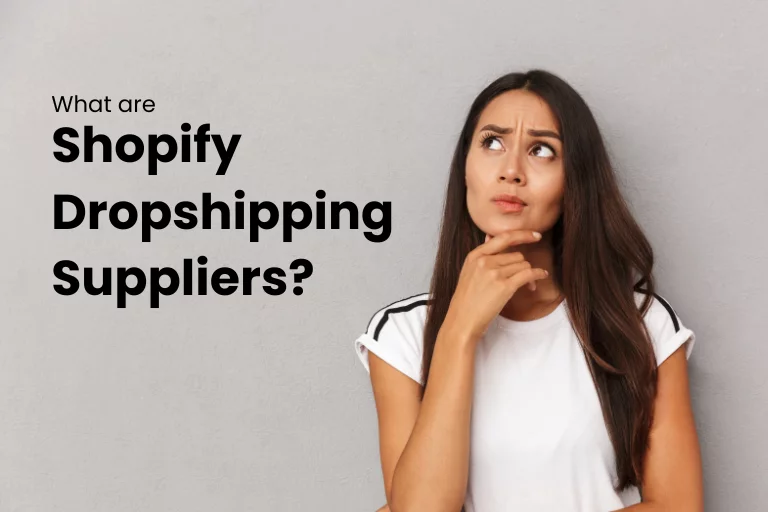
Suppliers: The Secret Sauce: Behind Dropshipping Success! Imagine you want to start your online store but are not keen on stuffing your garage with products or dealing with the hassle of shipping. That’s where suppliers in dropshipping come into play, and they’re the unsung heroes behind many successful e-commerce ventures.
How do suppliers in Shopify dropshipping work?
Let’s break it down. As the online store owner, you create a beautiful storefront; think of it as your digital shop window. Customers come in, browse your products, and make purchases. Now, instead of you shipping those products, the supplier takes the stage.
Supplier’s Role: Shipping Superstar
When a customer confirms a order, you forward the order to your supplier. The supplier then kicks into action. They pick, pack, and ship the product directly to the customer. You don’t have to worry about packing peanuts or postage labels; it’s all in their capable hands.
A supplier in dropshipping is like the backstage crew of your e-commerce production. They provide the products, handle the shipping, and allow you to focus on what you do best—creating a killer online shopping experience.
Where can I find reliable dropshipping suppliers for Shopify?
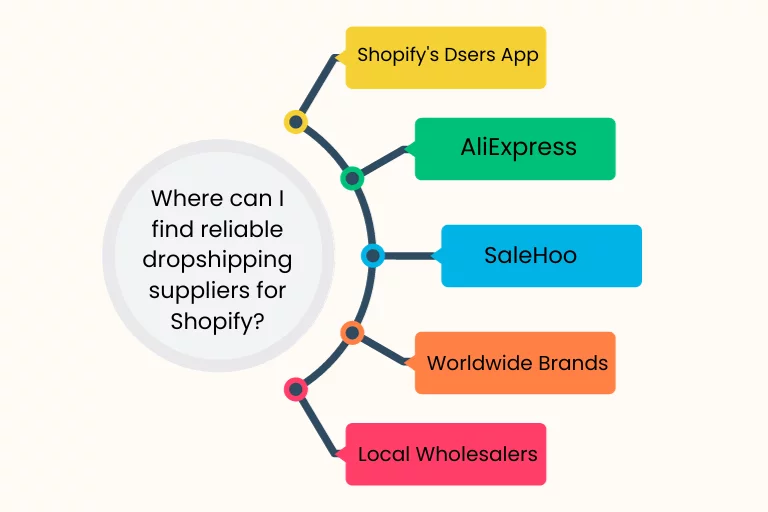
Regarding Shopify dropshipping, one of the most crucial decisions you’ll make is choosing suitable suppliers. These partners will determine product quality, shipping times, and your customers’ satisfaction. With years of experience in this arena, I’m here to guide you on where to find reliable dropshipping suppliers for your Shopify store:
Shopify’s Dsers App:
Within the Shopify ecosystem, this is a GEM. Dsers smoothly links you with a vast supplier directory that offers a variety of goods. It simplifies the entire process – from product import to order fulfillment.
AliExpress:
A go-to for many drop shippers, AliExpress boasts an extensive list of over 2 million suppliers, making it easy to find products in various niches. Look for suppliers with high ratings and reviews for added peace of mind.
SaleHoo:
This is a trusted directory of wholesale suppliers and manufacturers. It boasts a roster of over 8,000 carefully screened suppliers hailing from various corners of the globe, with a substantial portion originating from the United States. SaleHoo rigorously screens its suppliers, ensuring you have access to a network of reliable partners.
Worldwide Brands:
Known for its commitment to quality, Worldwide Brands is a directory of around 10,000 certified wholesalers and dropshippers with 16+ million products. It’s a one-stop shop for finding reliable suppliers across various industries. But to use Worldwide Brand, you need to pay a membership fee. They offer two payment options: You can opt for a single, one-time payment of $299, or you have the choice of participating in the recurring payment program, which involves an initial amount of $99 followed by two subsequent payments of $110 each.
Local Wholesalers:
Attention local suppliers or manufacturers in your region. They can offer quicker shipping times and more personalized support.
How do you find excellent or reliable suppliers for dropshipping?
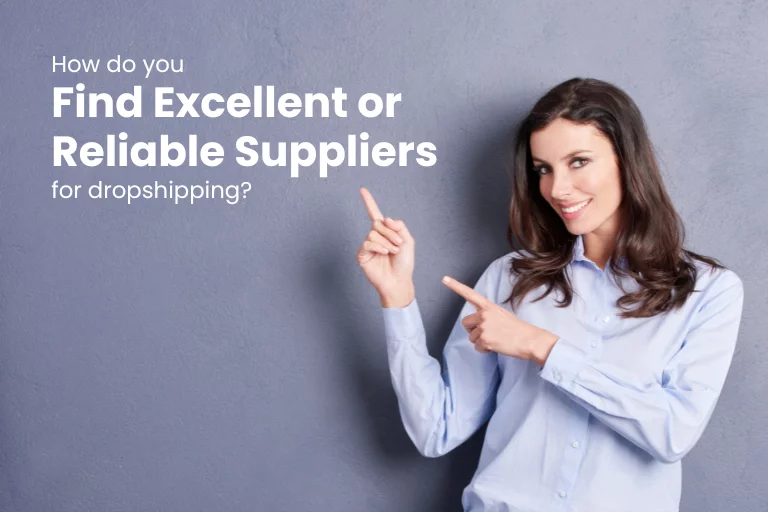
Finding an excellent dropshipping supplier is essential to your e-commerce business’s success. Here are some qualities to look for in a reliable and trustworthy dropshipping supplier:
- Product Quality: Your supplier should provide high-quality products that meet or exceed customer expectations. Poor-quality items can lead to customer complaints and damage your reputation. So, it’s crucial to do dropshipping product research.
- Reliability: A good supplier is consistent in delivering products on time. Late shipments can result in unhappy customers and lost sales.
- Competitive Pricing: While low prices are attractive, be cautious of suppliers that offer prices that seem too good to be true. Ensure that the pricing allows you to maintain a reasonable profit margin.
- Responsive Communication: Effective communication is crucial. Your supplier should be accessible and responsive to your inquiries, promptly addressing concerns or issues.
- Dropshipping-Friendly: Ensure that the supplier is experienced and knowledgeable about dropshipping. They should be willing to work with drop shippers and provide support as needed.
- Robust Shipping Options: Look for suppliers that offer multiple shipping options, including ePacket or other reliable and trackable methods. Faster shipping can lead to happier customers.
- Return Policy: Understand the supplier’s return policy and warranty terms. A good supplier should have a fair return policy that allows for returns or exchanges when necessary.
- Positive Reviews and Reputation: Research the supplier’s reputation by reading reviews from other drop shippers. A supplier with a good track record is more likely to be reliable.
- Quality Control: Ensure the supplier has quality control measures to minimize issues with defective or damaged products.
Remember that finding the right supplier may take some time and research. Take your time with partnerships; carefully vet your options to ensure a successful and long-term business relationship. Additionally, consider using dropshipping platforms or directories to find reputable suppliers that meet these criteria.
What kinds of suppliers can I use with Shopify?
Shopify is a versatile e-commerce platform that allows you to work with various suppliers. Here are some common types of suppliers you can use with Shopify:
- Dropshipping Suppliers: One of the most popular choices for Shopify store owners, dropshipping suppliers stock and ship products directly to your customers. Well-known dropshipping suppliers include AliExpress, Oberlo (now integrated with Shopify), SaleHoo, and Spocket.
- Wholesale Suppliers: If you prefer to buy products in bulk and manage your inventory, wholesale suppliers are a good choice. You can find wholesalers through Alibaba, Wholesale Central, and SaleHoo. Some may require a business license or meet specific minimum order quantities.
- Private Label Suppliers: If you want to sell branded or unique products, you can work with private label suppliers. These suppliers allow you to customize products with your branding. Finding the right private-label supplier may require more research and negotiation.
- Manufacturers: You can work directly with manufacturers if you want complete control over your product line. This option is standard for businesses that want to create custom products or have specific quality control requirements.
- Local or Artisanal Suppliers: Depending on your niche, you may find local or artisanal suppliers who produce unique, handcrafted, or locally sourced products. This can be a great selling point for your store and supports local businesses.
- Specialized or Niche Suppliers: Some niches have specialized suppliers catering to specific industries. For example, if you’re in the automotive industry, you might work with specialized automotive parts suppliers.
What are the types of suppliers?
Let’s clarify the differences between various terms related to suppliers:
- Approved Supplier:
- An approved supplier is a supplier that has undergone a vetting and evaluation process by a company or organization. They meet specific criteria and standards set by the company, making them eligible to provide goods or services. Approved suppliers are typically considered reliable and trustworthy partners.
- Key Suppliers:
- Key suppliers, also known as strategic suppliers, significantly impact a company’s operations, supply chain, or business success. They often provide critical goods or services essential to the company’s core operations. These suppliers are closely managed and may have long-term relationships with the company.
- Powerful Suppliers:
- The term “powerful suppliers” refers to suppliers with significant bargaining power in a business relationship. This power can arise from unique or essential products, limited alternatives, or high switching costs. Powerful suppliers can influence pricing, terms, and conditions in their favor.
- Good Supplier:
- A good supplier is a supplier that consistently meets or exceeds the expectations of a company. They provide high-quality products or services, adhere to agreed-upon terms and conditions, offer competitive pricing, maintain reliable communication, and deliver on time.
Strategies to help you find dropship suppliers:
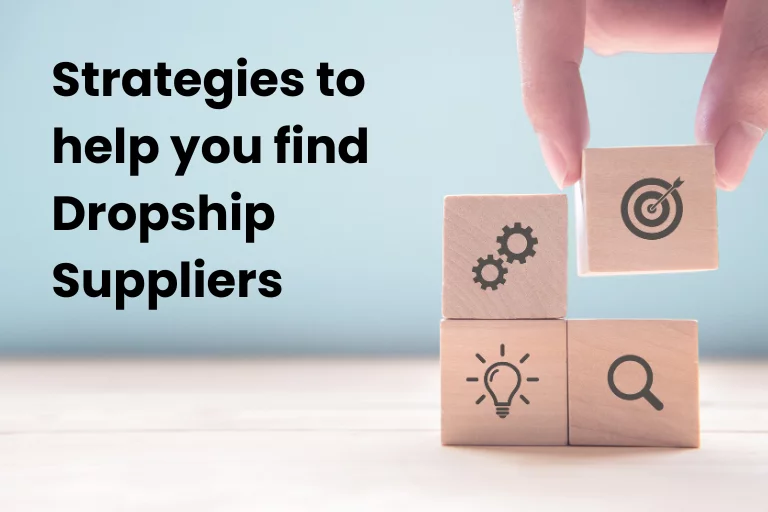
When choosing a supplier for your Shopify store, consider factors like product quality, reliability, shipping times, and pricing. Additionally, ensure that the supplier’s offerings align with your target audience’s preferences and needs. Remember that you can work with multiple suppliers to offer a diverse product range in your store.
How do I find dropship suppliers?
Finding dropshipping suppliers is a crucial step in building your e-commerce business. Here are several effective strategies to help you find dropship suppliers:
- Use Shopify Apps:
- Shopify offers apps like Dears (now part of Shopify) and Spocket that connect you with dropshipping suppliers. These apps have pre-vetted suppliers and make adding products to your store easy.
- Online Directories and Marketplaces:
- Explore popular online directories and marketplaces like AliExpress, Alibaba, SaleHoo, and Doba. These platforms have a range of suppliers and products for various niches.
- Google Search:
- Use specific search terms like “[Your Niche] dropshipping suppliers” or “[Product Type] dropshipping” in Google to discover potential suppliers. Remember to explore the later search results pages, as hidden gems might be there.
- Supplier Directories:
- Some websites and organizations compile lists of verified dropshipping suppliers. Check out directories like SaleHoo and Worldwide Brands for access to reputable suppliers.
- Contact Manufacturers:
- Reach out directly to manufacturers of products you’re interested in. Ask if they offer drop shipping services or if they can recommend authorized distributors.
- Social Media and Forums:
- Join relevant forums, social media groups, and communities related to your niche. Engage with members and ask for supplier recommendations. Reddit, Facebook Groups, and platforms like Warrior Forum can be helpful.
- Review Supplier Reviews:
- Read reviews and testimonials from other drop shippers about their experiences with specific suppliers. These insights can help you identify reliable partners.
- Contact Manufacturers Directly:
- Consider contacting the manufacturer directly if you have a specific product in mind. Inquire if they offer drop shipping services or if they can recommend authorized distributors.
- Google Ads and Social Media Ads:
- Sometimes, suppliers use online advertising to reach potential drop shippers. Keep an eye out for Google Ads and social media ads that promote dropshipping opportunities.
- Wholesale Directories:
- Websites like Wholesale Central and Wholesale Directory list wholesalers that may offer dropshipping options. It’s worth exploring these directories for potential suppliers.
Remember, when you find potential dropshipping suppliers, thoroughly research and vet them. Check their product quality, pricing, shipping times, and reliability. Test orders or request samples to evaluate their services before committing to a long-term partnership. Building a solid relationship with reliable suppliers is a critical factor in the success of your dropshipping business.
Discover the Best Supplier for Shopify

Selecting the correct type of supplier is crucial for optimizing the supply chain, reducing costs, and meeting customer demands. Businesses should carefully evaluate suppliers’ needs and maintain strong relationships to ensure smooth operations and product availability.
The “best” supplier for Shopify depends on various factors, including your business niche, goals, budget, and preferences. Different suppliers are suitable for different types of businesses. Here are some popular supplier options for Shopify and the scenarios in which they excel:
- Dropshipping Suppliers:
- Best for: Beginners, small businesses with limited capital, and businesses looking for a low-risk way to start selling products online.
- Recommended Options: AliExpress, SaleHoo, Spocket.
- Print-on-Demand Suppliers:
- Best for: Businesses selling custom products, such as apparel, accessories, or home decor, with the ability to create unique designs.
- Recommended Options: Printful, Printify, AOP+.
- Wholesale Suppliers:
- Best for: Businesses looking to buy products in bulk and manage their inventory with the resources to purchase and store products.
- Recommended options: Alibaba, SaleHoo, and Wholesale Central.
- Private Label Suppliers:
- Best for: Businesses interested in creating their brand and selling unique, branded products.
- Recommended Options: Partnering with manufacturers directly to create custom-branded products.
- Local or Artisanal Suppliers:
- Best for: Businesses focused on supporting local or artisanal products, which can have unique appeal and story-driven marketing.
- Recommended Options: Connect with local artisans or small-scale producers in your area.
- Specialized or Niche Suppliers:
- Best for: Businesses operating in specialized niches that require unique or hard-to-find products.
- Recommended Options: Specialized suppliers within your specific industry or niche.
- Fulfillment Centers:
- Best for: Businesses that want to outsource order fulfillment, inventory management, and shipping to experts, often used for scalability.
- Recommended Options: ShipBob, ShipMonk, Red Stag Fulfillment.
- Certified or Premium Suppliers:
- Best for: Businesses in industries with strict quality standards or premium product requirements.
- Recommended Options: Seek suppliers with relevant industry certifications or a reputation for high-quality products.
The “best” supplier ultimately depends on your unique business needs and goals. Consider factors such as product type, quality, pricing, shipping times, and your ability to manage inventory. Additionally, it’s crucial to research and vet potential suppliers thoroughly to ensure they align with your business objectives and customer expectations. Shopify offers integrations and apps that streamline connecting with various suppliers, making finding the right fit for your e-commerce business easier.
How do we maintain strong supplier relationships?
- Networking: Join online forums, dropshipping communities, and social media groups. Engage with fellow dropshippers who can recommend reliable suppliers based on their experiences.
- Direct Outreach: Sometimes, reaching out directly to brands or manufacturers can yield fruitful partnerships. Explain your business model and inquire about dropshipping opportunities.
- Supplier Directories: Explore other supplier directories, such as SaleSource, Dropship Direct, and Spocket, to uncover a wide range of products and suppliers.
- Scour Online Marketplaces: Beyond AliExpress, platforms like Alibaba have third-party sellers who offer dropshipping partnerships.
Remember, while finding reliable suppliers is essential, ongoing communication, trust-building, and regular evaluation are equally crucial for a successful Shopify dropshipping venture. The e-commerce landscape is dynamic, so staying adaptable and maintaining strong supplier relationships is critical to long-term success. Happy dropshipping!
The best example of a supplier is Alibaba.
One of the best examples of suppliers that have made a significant impact in the e-commerce industry is Alibaba Group. Alibaba is a Chinese multinational conglomerate founded by Jack Ma in 1999. It has become one of the world’s largest and most prominent online marketplaces and technology companies.
Here’s why Alibaba is an exemplary supplier in the e-commerce landscape:
- Global Reach: Alibaba connects buyers and sellers from around the world. It has a vast network of suppliers and buyers across different continents, making it a truly global marketplace.
- Supplier Verification: Alibaba has implemented supplier verification and assessment systems, including Gold Supplier and Trade Assurance, to help buyers identify reliable and trustworthy suppliers.
- Customization and Branding: Alibaba offers customization options, allowing businesses to create private label products and customize packaging, helping them build their brand identity.
- Secure Payment Options: The platform offers secure payment methods, including Alibaba’s payment service, Alipay, providing financial security for buyers and sellers.
- Logistics and Shipping: Alibaba provides various shipping options, including ocean and air freight, making it convenient for businesses to arrange transportation for their orders.
Alibaba’s success story exemplifies how a supplier can transform and revolutionize how businesses source products and conduct e-commerce globally.
Some jaw-dropping statistics that reveal the world of dropshipping:
Let’s journey through captivating statistics that vividly depict the worldwide dropshipping landscape.
- A Growing Trend: Did you know that about 33% of businesses have embraced dropshipping as their primary sales model? That’s like a secret handshake among savvy entrepreneurs!
- Billions in Sales: Brace yourself for this staggering number – a whopping $85 billion in sales flow through the dropshipping channels. It’s like a gold rush of the e-commerce world, representing nearly 23% of all online sales!
- Profit Powerhouse: Dropshipping isn’t just a trendy buzzword; it’s a money-making machine! It’s reportedly 10 to 20% more profitable than affiliate marketing. However, affiliate marketing still manages to steal the spotlight regarding digital products like SaaS and online courses.
- Rising Digital Buyers: Imagine a sea of 2.14 billion digital buyers across the globe, clicking and shopping online. That’s a significant surge from 2017, when we had a mere 1.66 billion digital buyers. E-commerce is truly taking over!
- Supplier’s Sweet Spot: Here’s a fascinating twist – suppliers often profit more when selling their products to dropshippers than through their online stores. It’s like finding the hidden treasure map to success!
- The E-commerce Universe: Approximately 24 million e-commerce stores are twinkling worldwide. But guess what? Many of these stars are dropshipping websites, shining bright in the vast digital sky.
- The Social Advantage: Want to crank up your dropshipping store’s revenue? Well, it’s as simple as having at least one social media account. Stores with a social presence tend to generate a whopping 32% higher revenue. It’s like having a magic wand for business growth!
- Fulfillment of Choice: Dropshipping is the go-to fulfillment model for about 33% of online stores. It’s like the preferred flavor of ice cream at an e-commerce carnival, and it’s easy to see why!
Whether you’re a seasoned dropshipper or just starting, these numbers speak volumes about the exciting opportunities and trends in this ever-evolving digital realm.
According to recent statistics, the dropshipping market is expected to grow to $243.42 billion in 2023. Additionally, after a surge of 23.7% from 2022 statistics, this is the first year it has exceeded $200 billion.
Additionally, by 2027, the dropshipping industry will be valued at $500 billion. It’s excellent to know that predictions indicate this sector will grow at a CAGR of 27.1% from 2022 to 2031.
FAQ for Finding Reliable Shopify Dropshipping Suppliers

Is drop-shipping profitable?
Yes, dropshipping can be profitable with a low initial investment and minimal overhead costs, making it an attractive option for entrepreneurs. Profitability can vary due to factors like intense competition, thin profit margins, supplier reliability, and the need for effective marketing.
Profitability hinges on a well-executed business strategy, careful product selection, strong supplier partnerships, and efficient marketing and customer service efforts.
Do I need a brand for dropshipping?
No, you don’t necessarily need a brand to start dropshipping, but having a brand can be advantageous in the long run. You can begin shipping without a brand, but consider building one over time to establish a long-term presence and customer recognition.
Can I dropship from Alibaba?
Yes, you can dropship products from Alibaba by partnering with suppliers offering dropshipping services. Ensure you thoroughly research and vet Alibaba suppliers to choose reliable partners for your dropshipping business.
Is AliExpress good for drop-shipping?
Yes, AliExpress is a popular platform for dropshipping due to its vast product selection, competitive prices, and ease of use. While AliExpress can be suitable for dropshipping, careful supplier selection and quality control are crucial to ensuring customer satisfaction and business success.
Is Amazon dropshipping profitable?
Amazon dropshipping can be profitable due to the platform’s vast customer base and reach. Profitability depends on navigating competition, fees, and strict policies. Success often requires effective strategies and careful management.
Can you drop off the ship alone?
Yes, you can dropship alone. Operating a dropshipping business as a solo entrepreneur or sole proprietor is possible. As a solo dropshipper, you’ll handle various aspects of the business, including product selection, marketing, customer service, and order management. Effective time management and skill diversification are essential.
How do you start dropshipping for free?
- Start with a free e-commerce platform like Shopify’s 3-day trial or WooCommerce for WordPress, which offers basic features without upfront costs.
- Utilize free tools for tasks like market research (Google Trends), graphic design (Canva), and SEO optimization (Yoast SEO for WordPress).
- Start with organic social media and email marketing using free platforms like Instagram, Facebook, and MailChimp, gradually investing as your business grows.
How many dropshippers are successful?
- Success rates vary widely, with factors like niche selection, marketing strategies, and dedication playing significant roles.
- Some drop shippers succeed significantly, while others need help with their profitability.
Can I dropship with multiple suppliers?
Yes, you can dropship with multiple suppliers, and it’s a common practice in e-commerce. This approach is often referred to as “multi-source dropshipping.” It allows you to improve product availability and reduce the risk of relying on a single supplier.
How Many Shopify Stores Are Dropshipping?
Exact numbers are unavailable, but dropshipping has been a popular e-commerce model, and many Shopify stores incorporate dropshipping into their business models.
Where Can I Find a Prebuilt Shopify Store Waiting Just for Me?
If you’re searching for a prebuilt Shopify store ready to take your e-commerce dreams to the next level, look no further than Bebiggy! At bebiggy.com, stores are meticulously crafted and designed to perfection, covering many niches and products.
Conclusion
Our exploration of the world of suppliers has been quite a ride. We’ve covered different types of suppliers, the qualities that make them great, and the importance of finding the right fit for your business. Whether starting fresh or fine-tuning your supply chain, remember that it’s all about compatibility, just like in any good relationship. Communication and trust are essential.
So, as you search for your perfect supplier, keep your priorities in mind: reliability, product quality, or flexibility. And always stay open to new opportunities in the ever-evolving e-commerce landscape. With the right supplier on board, your business can reach new heights and provide top-notch products and experiences to your customers. Here’s to building solid partnerships and achieving the success you’ve dreamed of!

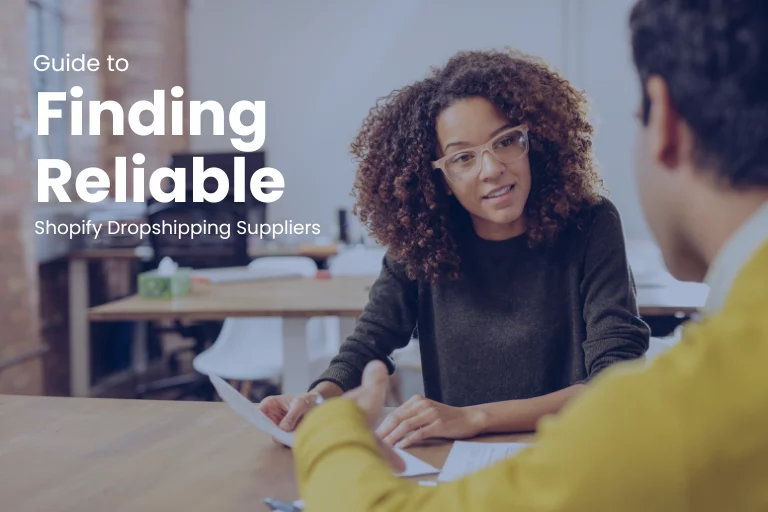








 What Is Shopify Dropshipping and How Does It Work?
What Is Shopify Dropshipping and How Does It Work? 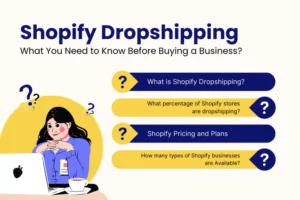 Shopify Dropshipping: What You Need to Know Before Buying a Business?
Shopify Dropshipping: What You Need to Know Before Buying a Business?  How To Start A Blog Step By Step
How To Start A Blog Step By Step  Headless Shopify: Ultimate Guidelines for 2023 [Latest]
Headless Shopify: Ultimate Guidelines for 2023 [Latest]